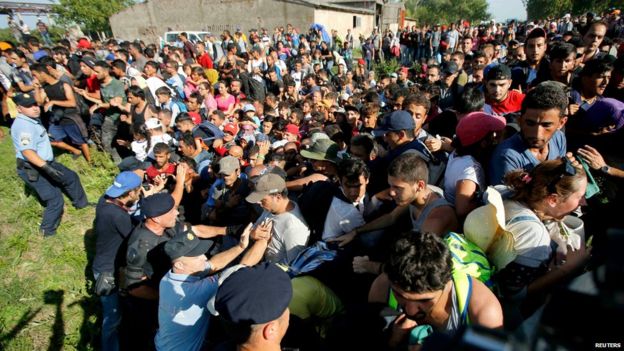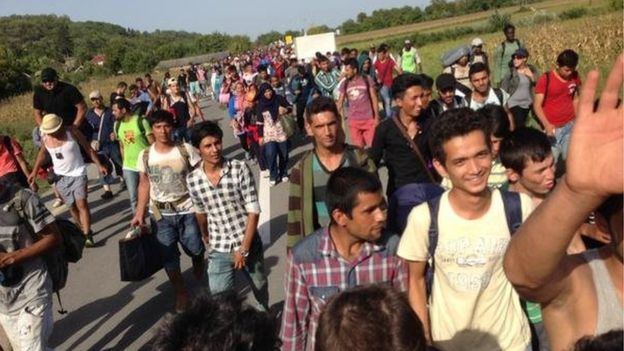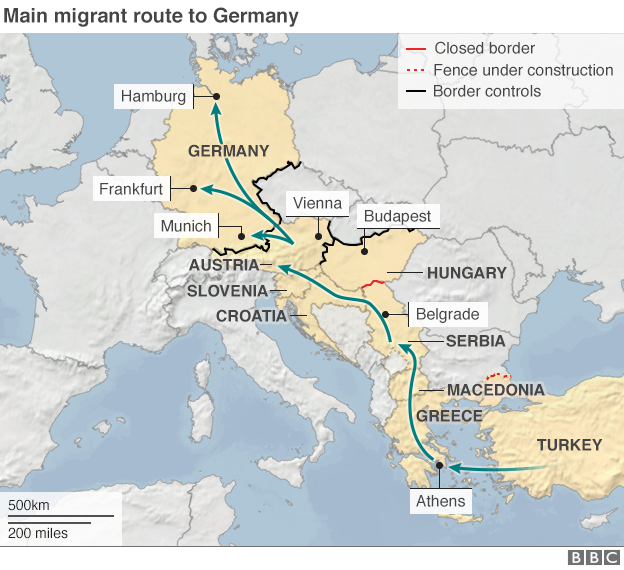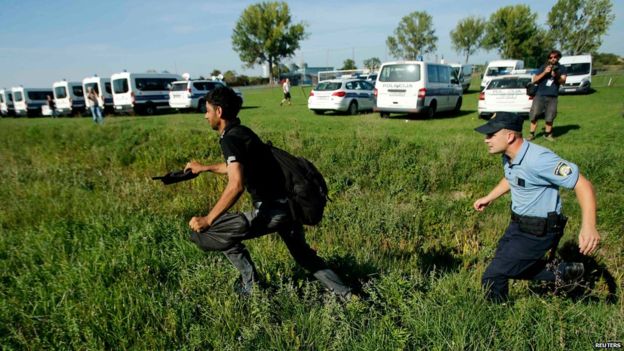Migrants break through Croatia police lines at Tovarnik

Crowds of migrants have scuffled with Croatian police in at least two places along the border with Serbia as they seek to enter the European Union.
They briefly broke through police lines at Tovarnik and Bezdan after hours waiting in full sun. At least 8,900 migrants entered Croatia on Thursday, officials said, after Hungary closed its border, blocking the previous land route into the EU. Croatia's interior minister says the country is "absolutely full". EU leaders will hold an emergency summit next week to discuss the crisis.
Croatia's president has asked the army to be ready to protect its borders from "the illegal migration", state news agency Hina reported (in Croatian).
Officials say migrants must apply for asylum there or be treated as illegal immigrants.
The crowds fled from authorities after breaking through police lines
Under EU regulations, refugees must register and claim asylum in the first member state they reach.
A migrant and a policeman run during a stampede to board a bus in Tovarnik, Croatia
Migrants push policemen during a stampede to board buses in Tovarnik, Croatia

Many hundreds of people were angry at being trapped by police lines

Those waiting at the border crossing endured sweltering heat
Correspondents described the scenes in Tovarnik as mayhem, after several thousand migrants who had crossed from Serbia were held back by riot police, trying to get them to wait for transport on from the border.
Croatian police eventually gave way under pressure. Some of the migrants said they intended to walk to neighbouring Slovenia.
Slovenia, like Hungary, is an entry point to the Schengen zone, which normally allows people to travel between member countries without restrictions.
Many migrants are exhausted. Supplies of food and water are running low.
At the scene: Fergal Keane, BBC News, Tovarnik
All morning several thousand people had waited in the heat hoping a train would take them north on their long journey to Germany.
Around midday we saw a group of young men begin to mobilise for a protest.
At first they tried to walk towards Zagreb on the rail line but were turned back by the police. They then walked to the police line on the road next to the station. For about an hour they chanted "let us go" and pressed the police to be allowed through.
Eventually police allowed some women and children to squeeze past their line.
Scenes of chaos followed. Men tried to push through. Children became separated from parents.
The police did not resort to force. There was no use of batons or tear gas. They attempted to push the crowd back but could not prevent a breach.
I saw hundreds pushing through a wire fence and running towards the main road. On the way a man suffered a heart attack.
A combination of angry young men, extraordinary numbers of people and a lack of any coherent plan by the EU has produced scenes of chaos in Europe.
Hungarian media have reported that dozens of migrants were crossing from Croatia into Hungary at Illocska, within 50km (30 miles) of Bezdan — thus avoiding the fence on Hungary's border with Serbia.
Croatia said it would allow migrants to travel into northern Europe, but officials in Slovenia — which borders Croatia to the north — have said they would tighten their border security and stick to rules which require asylum-seekers to register on arrival.

Migrants who have pushed through the police line on Croatia border at Bezdan

Map showing main migrant route north from Turkey to Germany
On Wednesday, Hungarian authorities used water cannon and tear gas at the border with Serbia to stop hundreds of migrants forcing their way through.
The United Nations' top human rights official said the images from the border were "truly shocking".
Zeid Ra'ad al-Hussein said he was appalled at Hungarian authorities' actions, some of which "amount to clear violations of international law".
Separately on Thursday, European Council President Donald Tusk announced an emergency summit on migration on 23 September.
The European Parliament voted to back plans for the mandatory relocation of 120,000 refugees around the EU, but interior ministers from EU countries have not so far been able to reach agreement on the plan.
In other developments:
Germany has extended border controls currently in place with Austria to the Czech Republic
The head of the German agency in charge of migration and refugees has resigned, citing personal reasons
Authorities in Paris, France, are moving more than 500 migrants out of tent camps and offering them accommodation elsewhere
Bulgaria is sending extra troops to its border with Turkey in case of a further influx of refugees, its defence minister says
Hundreds of migrants are stranded near the Turkish city of Edirne, close to the border with Bulgaria and Greece
Austrian railways say services to and from Hungary, suspended on 10 September, will follow their normal timetable from Friday
Czech PM Bohuslav Sobotka has indicated his country could voluntarily offer asylum to around 10,000 refugees — far more than the 1,500 the Czech Republic has so far agreed to accept
Политика конфиденциальности | Правила пользования сайтом








